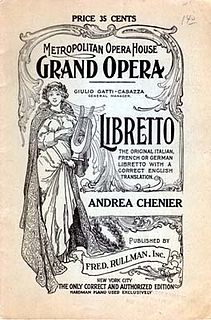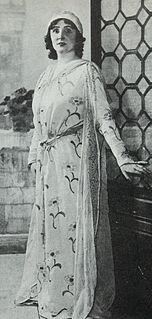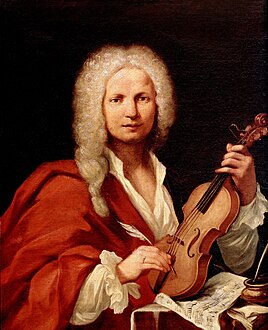Related Research Articles

A libretto is the text used in, or intended for, an extended musical work such as an opera, operetta, masque, oratorio, cantata or musical. The term libretto is also sometimes used to refer to the text of major liturgical works, such as the Mass, requiem and sacred cantata, or the story line of a ballet.

Orfeo ed Euridice is an opera composed by Christoph Willibald Gluck, based on the myth of Orpheus and set to a libretto by Ranieri de' Calzabigi. It belongs to the genre of the azione teatrale, meaning an opera on a mythological subject with choruses and dancing. The piece was first performed at the Burgtheater in Vienna on 5 October 1762, in the presence of Empress Maria Theresa. Orfeo ed Euridice is the first of Gluck's "reform" operas, in which he attempted to replace the abstruse plots and overly complex music of opera seria with a "noble simplicity" in both the music and the drama.

Serse is an opera seria in three acts by George Frideric Handel. It was first performed in London on 15 April 1738. The Italian libretto was adapted by an unknown hand from that by Silvio Stampiglia (1664–1725) for an earlier opera of the same name by Giovanni Bononcini in 1694. Stampiglia's libretto was itself based on one by Nicolò Minato (ca.1627–1698) that was set by Francesco Cavalli in 1654. The opera is set in Persia about 470 BC and is very loosely based upon Xerxes I of Persia. Serse, originally sung by a mezzo-soprano castrato, is now usually performed by a female mezzo-soprano or countertenor.

Lo sposo deluso, ossia La rivalità di tre donne per un solo amante is a two-act opera buffa, K. 430, begun by Wolfgang Amadeus Mozart in July 1783 but abandoned in November. The opera was never completed and only a 20-minute fragment from act 1 exists.
"Ombra mai fu", also known as "Largo from Xerxes", is the opening aria from the 1738 opera Serse by George Frideric Handel.

Salvadore Cammarano was a prolific Italian librettist and playwright perhaps best known for writing the text of Lucia di Lammermoor (1835) for Gaetano Donizetti.
Il Sant'Alessio is an opera in three acts composed by Stefano Landi in 1631 with a libretto by Giulio Rospigliosi. Its first performance was probably in February 1632.
Le cinesi is an opera in one act, with music composed by Christoph Willibald Gluck. The Italian-language libretto was by Pietro Metastasio, and he described it as a componimento drammatico. This libretto had first been set by Antonio Caldara in 1735. For Gluck's rework, the piece is often considered as an azione teatrale, even though Metastasio and the composer both retained the original designation. The work was first performed for the Austrian royal family at the Schloss Hof on 24 September 1754, on the occasion of the visit of the Empress Maria Theresa to the household of Saxe-Hildburghausen.
"Sposa son disprezzata" is an Italian aria written by Geminiano Giacomelli. It is used in Vivaldi's pasticcio, Bajazet.

Persée (Perseus) is a tragédie lyrique with music by Jean-Baptiste Lully and a libretto by Philippe Quinault, first performed on 18 April 1682 by the Opéra at the Théâtre du Palais-Royal in Paris.

La finta semplice, K. 51 (46a) is an opera buffa in three acts for seven voices and orchestra, composed in 1768 by then 12-year-old Wolfgang Amadeus Mozart. Young Mozart and his father Leopold were spending the year in Vienna, where Leopold was trying to establish his son as an opera composer. He was acting on a suggested request from the Emperor Joseph II that the young boy should write an opera.

"O mio babbino caro" is a soprano aria from the opera Gianni Schicchi (1918) by Giacomo Puccini to a libretto by Giovacchino Forzano. It is sung by Lauretta after tensions between her father Schicchi and the family of Rinuccio, the boy she loves, have reached a breaking point that threatens to separate her from Rinuccio. It provides an interlude expressing lyrical simplicity and love in contrast with the atmosphere of hypocrisy, jealousy, double-dealing, and feuding in medieval Florence. It provides the only set-piece in the through-composed opera.

Domènec Terradellas was a Catalan opera composer. The birthdate is sometimes incorrectly given as 1711. Carreras i Bulbena did extensive research in contemporary documents, such as baptismal records, and found that the correct date was 1713. All his works are thoroughly Italian in style.

Scanderbeg is an opera in three acts composed by Antonio Vivaldi to an Italian libretto by Antonio Salvi. It was first performed at the Teatro della Pergola in Florence on 22 June 1718 to mark the re-opening of the theatre to public performances. While the libretto has been preserved, only fragments of the original score remain.

Demofoonte is an opera in three acts by the Czech composer Josef Mysliveček. It was the composer's second setting of this popular libretto by Metastasio first produced in 1733. It was typical for subsequent setting of Metastasian dramas to incorporate significant alterations, and this setting retains the augmentation of the role of Timante that is found in the composer's first setting of this text. All of Mysliveček's operas are of the serious type in Italian referred to as opera seria.
Luigi Mosca was Italian composer of operas and sacred music and a noted singing teacher. He composed eighteen operas, most of which were originally for theatres in Naples, but played throughout Italy in their day.

Luca Antonio Predieri was an Italian composer and violinist. A member of a prominent family of musicians, Predieri was born in Bologna and was active there from 1704. In 1737 he moved to Vienna, eventually becoming Kapellmeister to the imperial Habsburg court in 1741, a post he held for ten years. In 1765 he returned to his native city where he died two years later at the age of 78. A prolific opera composer, he was also known for his sacred music and oratorios. Although his operas were largely forgotten by the end of his own lifetime and most of their scores lost, individual arias as well some of his sacred music are still performed and recorded.
Nitocri is an opera in two acts composed by Saverio Mercadante to libretto by Apostolo Zeno adapted by Lodovico Piossasco Feys. The libretto is a fictionalised account of the Egyptian queen Nitocris. The opera premiered at the Teatro Regio in Turin on 26 December 1824.

"Va tacito e nascosto" is an aria written for alto castrato voice in act 1 of George Frideric Handel's opera Giulio Cesare in Egitto, composed in 1724 to a libretto by Nicola Francesco Haym. Sung by the character Julius Caesar, it features extensive solos for natural horn.